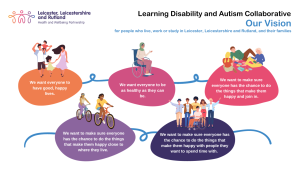The Dynamic Support Pathway (DSP) is a referral tool for individuals of all ages with a learning disability, autism or both, who are struggling with their mental health and wellbeing while living in the community.
The principal aim of the DSP is to ensure that concerns for individuals are identified early and the support they need is implemented quickly and effectively. This should help to prevent any further deterioration or escalation, which may lead to a crisis e.g., breakdown of a family unit, care order, admission to a mental health and/or learning disability hospital, offending behaviour etc.
Referrals to the DSP can be made if there is a deterioration in mental health wellbeing for any reason; some of these reasons may include:
- social withdrawal
- self-neglect
- anxiety
- increased verbal or physical aggression towards self and/or others
- damage to property
- self-harm
- suicidal thoughts
- escalating anxiety
- increased repetitive and restricted behaviours.
The DSP is designed to enhance collaborative joint working between services and to ensure the development of a bespoke action plan that will meet each individual’s needs in the community.
Through the DSP individuals will have access to the right support at the right time, in the right place and delivered by the right person.
Referrals
Referrals to the DSP can be made by any professionals supporting the individual, or alternatively individuals (or a family member, advocate etc.) can now refer themselves to the DSP using the online referral forms on the LLR website
The service operates Monday to Friday within usual working hours and is not available on bank holidays.
Documentation relating to the DSP:
- LDA Support Directory
- Adult DSP referral criteria
- CYP DSP referral criteria
- DSP consent form – easy read
- DSP consent form
- DSP consent form guidance
- DSP first MAM notes template
- DSP follow-up MAM notes template
- DSP post-discharge MAM notes template
- DSP guidance notes for individuals, families and carers
- DSP guidance notes for professionals
- DSP gaps in Service Form
The DSP supports the implementation of our vision for individuals with a learning disability and autistic people across Leicester, Leicestershire and Rutland.

Graphic depicting our our vision for individuals with a learning disability and autistic people across Leicester, Leicestershire and Rutland.

